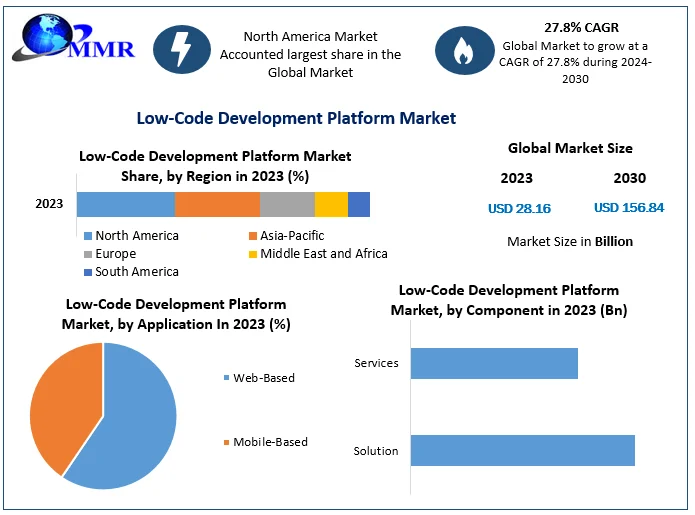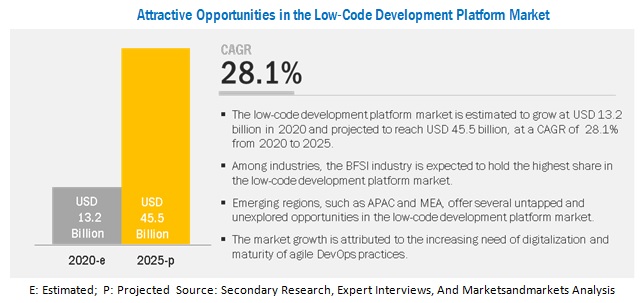New Advice To Deciding On Low-Code Platform Sites
New Advice To Deciding On Low-Code Platform Sites
Blog Article
The Advantages Of Low Code Application Development In Terms Of Integration Capabilities
Low-code development of applications offers huge advantages in terms of integration capabilities. These are vital for developing applications that seamlessly connect with different systems and services. Here are the key advantages: Pre-built connectors and APIs:
A Wide Variety of Connectors Low-code platforms usually have a large library of pre-built connectors for the most popular enterprise systems (e.g., CRM, ERP databases, cloud services, etc.). This makes it easier to integrate with systems.
API Integration - Many low-code platforms come with API integration, allowing developers easy access to external services or data sources.
Simple to use:
Drag-and-Drop Interfaces: A variety of integration tasks can easily be performed using drag-and–drop interfaces. This makes it possible for developers and others who are not developers to create complex systems without lengthy programming.
Visual Workflow Builders Visual tools to create workflows and data flows help in understanding and setting up integrations more easily.
Standardized Integration Methods:
SOAP and RESTful Service: Support for standard web services protocols like REST and SOAP allows for simple integration with a array of external software and systems.
OData Standards: OData standards allow for easy manipulation and access of data across different platforms and applications.
Real-Time Data Synchronization:
Real-Time Integrations: Lowcode platforms manage data synchronization in real time between the system and applications, ensuring data is always current and consistent throughout an organization.
Event-Driven architecture: Some platforms can support event-driven architectures. This allows applications to respond to events in real-time and is crucial for dynamic and interactive apps.
Legacy System Integration:
Bridging Old Systems and new Systems Low-code platforms typically provide tools for integration with existing legacy systems. This allows organizations to upgrade their IT Infrastructure without re-designing their existing systems.
Data Migration Tools - Built-in data-migration tools make it simple to transfer data from older systems to applications that use low-code.
Third-Party Service Integration:
Cloud Services: Integration with cloud services such as AWS Azure and Google Cloud allows easy deployment and scaling.
Business Applications Integration : The low-code platform is able to integrate with a variety of business applications, such as Salesforce.com, SAP, Microsoft Dynamics and more to provide a seamless workflow across various aspects of business.
Simplified Data Processing:
Unified Data models: Certain low-code platforms offer unified data modeling that makes data integration and management across different systems.
Data Connectors Data connectors that are pre-configured enable users to access and alter data from a variety of sources.
Security and Compliance
Secure Integrations - Low-code platforms are designed to make sure that integrations adhere to the security standards and protocols. This protects data both in transit and when it's stored.
Compliance Features: These platforms often have features to ensure that integrations comply with regulatory requirements (e.g., GDPR, HIPAA), providing assurance for companies handling sensitive data.
Extensibility:
Custom Codes and Scripts. For more complicated requirements for integration, low-code platforms usually allows the use of custom code and scripts. This allows flexibility without compromising user convenience.
Plug-in Ecosystems. An ecosystem of extensions and plug-ins will allow you to enhance your capabilities of integration, while adding new functionalities whenever needed.
Overall low-code development platforms provide powerful integration capabilities that make them an ideal instrument for creating integrated and effective applications. They can streamline the process of connecting disparate systems and enhance the flow of information. Businesses can also benefit from existing technology and implement new ones, while ensuring a seamless IT environment. Follow the most popular Low-code Platform for application development for website examples including application development platforms, ms azure sql, cross platform mobile development, ms azure sql, low code platforms, app modernisation, cross platform mobile dev, jdbc server, app platforms, app dev platform and more.
Benefits Low-Code Applications In Governance And Safety
Low-code development offers many benefits regarding security and governance. They are essential to ensure that apps are secure, reliable and well-managed throughout their entire lifecycle. Here are a few key benefits.
Unified Management Console: Low-code platforms typically provide a centralized management console where administrators can oversee and manage all applications, ensuring consistent governance across the entire organization.
Role-Based Access Control: These platforms have robust control based on roles that lets administrators define rules and enforce them. This permits only authorized users to change or access specific areas of the program.
Compliance and Regulatory Applicability:
Built-in Compliance Features: Many low-code platforms are designed to conform to industry standards and regulations (e.g. GDPR, HIPAA). They have frameworks and tools that help to ensure apps meet the requirements of these regulations.
Audit Trails and Logging Comprehensive logging and audit trails are usually integrated, allowing organizations to track changes, monitor access, and make sure that they are in compliance with internal and external rules and regulations.
Improve Security Measures
Data encryption: Low-code platforms typically provide built-in encryption for data in transit and in transit, ensuring that data with sensitive information is secure.
Security Certifications Many low-code vendors have security certificates (e.g. ISO 27001, SOC 2 ) that demonstrate compliance with high security standards. This adds additional confidence to users.
Automated updates for security:
Regular Security Updates and Patches : Low-code platform handle automatic security updates, patches and updates. Applications are therefore secured from threats of the present without requiring developer intervention manually.
Security Monitoring: Continuous monitoring of security tools are often included, providing real-time alerts and insights into potential security issues.
Data Governance:
Data Access Policies These systems permit organizations to define data access rules and enforce the policies, making sure that data is available only to those who have been granted access. They also ensure the data is utilized in a proper manner.
Data Masking and Anonymization: Tools built in to mask and anonymize data safeguard sensitive data, particularly in development environments and testing environments.
Consistent Lifecycle Application Management:
Development and deployment pipelines: Lowcode platforms typically provide integrated development-and-deployment pipelines with security checks. They guarantee security throughout the application's lifecycle.
Version Control - Integrated version controls helps monitor modifications to applications and allow users to revert them, if required. They also help maintain the integrity and quality of the application.
Authorization, User Authentication and Authorization
Single Sign On (SSO): Supporting single sign on and other advanced authentication techniques reduces the burden of managing users and increases security.
Multi-Factor Authentication – Many platforms are equipped with built-in functions for multi-factor authentication and provide an additional layer of security.
Policy Enforcement and Compliance:
Policy Templates: Low-code platforms usually have pre-defined templates for security and governance that allow organizations to quickly apply policies.
Tools for Monitoring Compliance: These tools track and continuously report on the status of compliance. They allow you to spot problems and address these issues in a proactive fashion.
Integrate into existing security infrastructures:
Integration seamless: Low-code platforms are able to be seamlessly integrated with the existing security tools and devices like firewalls and SIEM products (Security Information and Event Management), and identity management systems.
API Security API Security: API security features are built-in to allow integration with other systems, securing information and ensuring integrity of the applications.
Best Practices and Training:
Best practices for guideline: Several platforms have guidelines and suggested procedures for the creation of secure applications. These help non-developers meet security standards.
Security Training: Certain providers of low-code offer education and resources in security that will help users understand how to design and develop secure applications.
Low-code development provides a variety of benefits for governance and security that help ensure that applications are created and managed in a efficient, secure and compliant manner. These platforms include the frameworks and tools needed to manage and oversee the application development processes, secure sensitive data, while ensuring legal compliance and enforcing the policies. Follow the most popular basics on Enterprise application development with Low-code Platform for site tips including multiplatform mobile app development, rapid application design, rad application development, app modernisation, cross platform mobile development, cross platform mobile development, developing mobile apps, cross platform app dev, rad development, develop mobile application and more.
In Terms Of Vendor Support And Community Involvement, Low-Code Development Has Many Advantages.
Low-code platform development provides significant advantages, such as support from vendors and a community. This is essential to ensuring successful application implementation, ongoing maintenance and continuous improvement. Here are the major benefits: Support from the vendor
Comprehensive Technical Support:
Support Team with Dedicated Staff: Many low-code platforms come with dedicated support staff who are available to help with technical issues, troubleshooting issues and providing guidance. They will ensure that issues are resolved quickly.
Support is available 24/7: A lot of vendors offer 24/7 support, which can be particularly useful for businesses that operate across different time zones.
Onboarding and Training:
Vendors offer structured learning courses such as webinars, tutorials, and certificates to assist users in becoming familiar with the platform.
Customized Onboarding A lot of vendors offer customized services that help new clients implement the platform effectively and customize it to their specific needs.
Regular updates and enhancements
Continuous Improvements: Low-code providers frequently release updates, which include performance enhancements, new features, and security patches to keep the platform up-to-date.
Feedback Integration: Vendors incorporate feedback from users into their cycle of development to ensure that the platform is continually evolving to meet the evolving needs of its users.
Comprehensive Documentation:
Documentation - Comprehensive Documentation: A complete and well-organized documentation that covers everything from basic usage to advanced customisations, is often available. This lets users tackle problems on their own.
API References In-depth API documentation allows developers to create custom applications and integrate low-code platforms into other platforms.
Consultation and Professional Services:
Expert Consulting: Most companies offer consulting services for architectural planning, strategic planning and complicated implementations. This assists users maximize their platform's potential.
Custom Development Services: A few companies will provide custom development services to create functions or integrates for their customers that aren't readily accessible.
Community Support
Active User Groups:
Forums and discussion boards Forums and discussion boards: Many platforms that are low-code feature a vibrant community where users can seek help, share solutions and collaborate in finding the most efficient methods.
User Groups and Meetups Local and virtual user groups and meetups provide opportunities to meet, network, and sharing experiences with other users.
Knowledge Sharing & Collaboration:
Community-Contributed Resources: Users often share templates, modules, and extensions that they have developed, which can be reused or adapted by others, accelerating development and innovation.
Crowdsourced Solution Finding: The collective experience and wisdom of a group can be an excellent resource for finding solutions to complex problems.
Learning and Development
Community-led Training: Many groups hold workshops, sessions for training, and webinars. These are usually run by knowledgeable users who share practical knowledge and advanced techniques.
Online Tutorials and Courses Community members frequently develop and publish online courses, tutorials, and how-to guides, making better education resources available to all users.
Feedback and Influence
Product Feedback: Many forums offer channels to give feedback to the vendors. This can influence new features and improvements.
Beta Testing Programs: Active members of the community may be able to take part in beta testing programs. This gives them the chance to see first-hand new features, as well as the chance to influence the future of the system.
Recognition and Encouragement
Community Recognition Programs: A lot of vendors have recognition programs that acknowledge the contributions of community members who are active like MVP (Most Valuable Professional) programs.
Peer support: Community members tend to be willing to provide peer-to-peer support, offering their expertise and guidance for those less knowledgeable. They create a more collaborative atmosphere by encouraging the spirit of collaboration and building a community.
Overall, the combination a solid vendor's support as well as an active, vibrant community provide a comprehensive support system for low-code development. Users will have the ability to get the help, resources, and collaboration opportunities they need to build applications, deploy, keep them up to date and further enhance their apps.